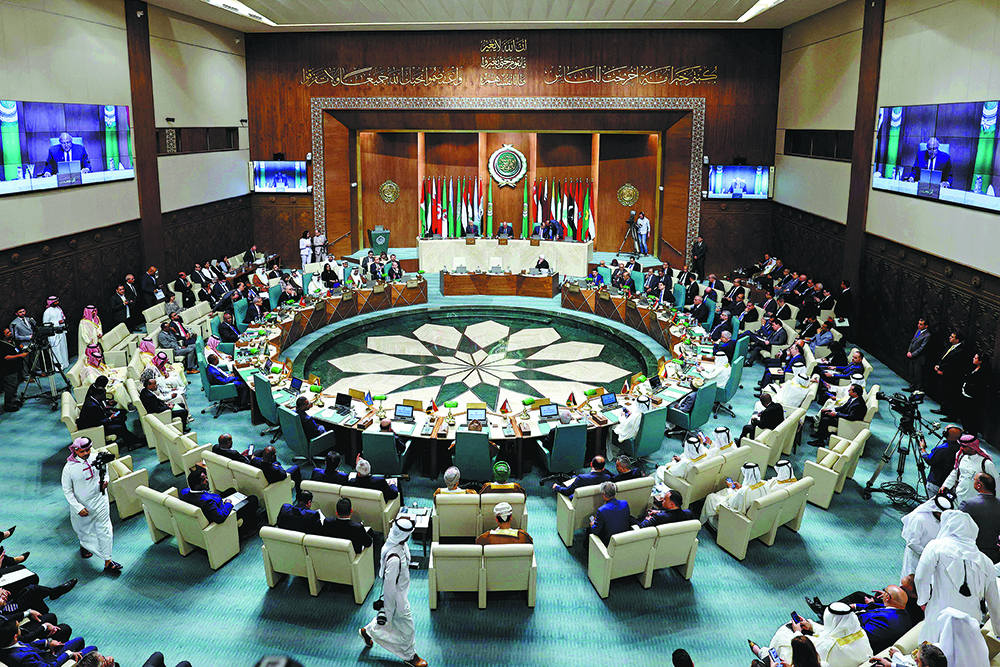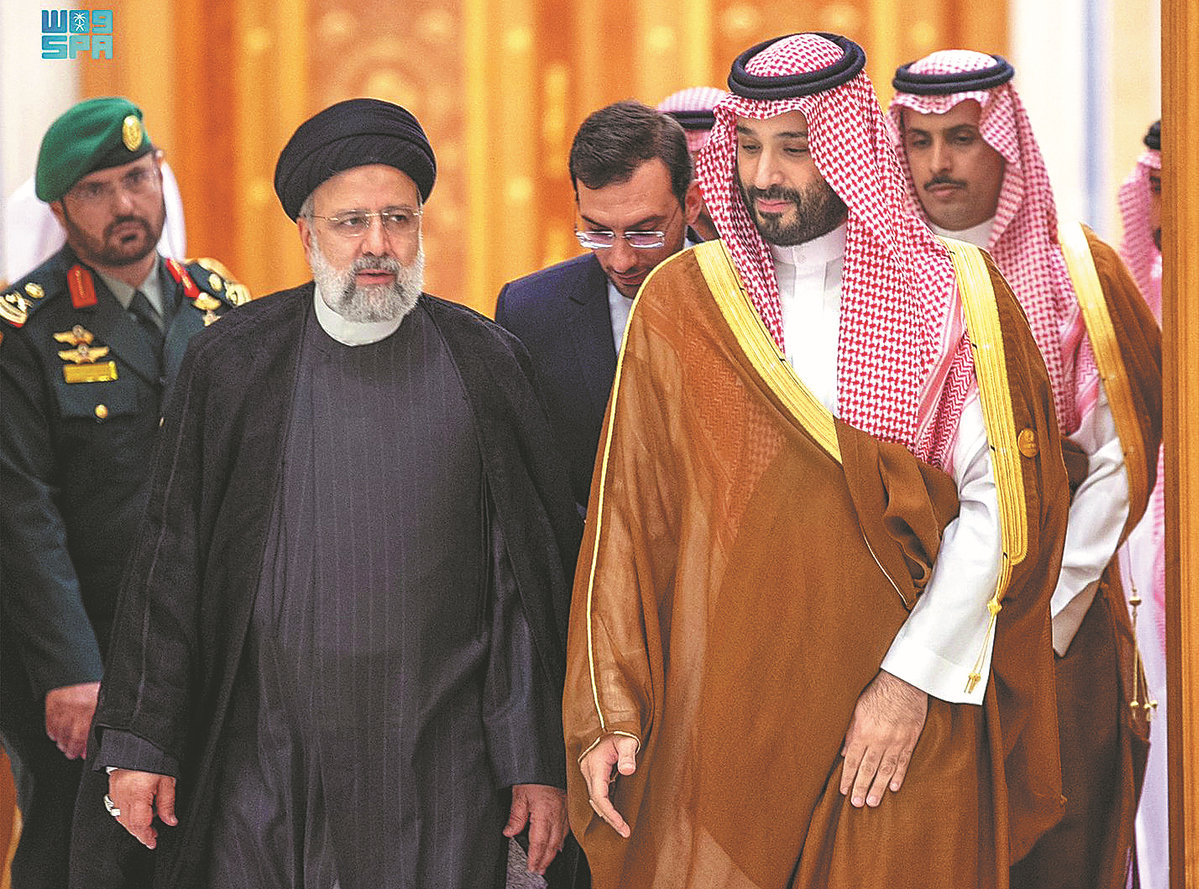Reconciliation a triumph of peace


Experts applaud China's mediation in Saudi-Iran deal as best practice of Global Security Initiative
Footage aired on Saudi Arabia's Al Ekhbariya TV shows Iran's President Ebrahim Raisi, wearing a traditional Palestinian keffiyeh scarf, greeting Saudi officials at the King Khalid International Airport in Riyadh after disembarking from his plane on Nov 11. Raisi was among leaders of the Arab and Islamic states who had gathered for a summit calling for a ceasefire to the current conflict in Gaza.
The visit was labeled a landmark because the summit on Gaza marked the first trip by an Iranian leader to the kingdom in 11 years, thanks to the peace deal reached by the two regional rivals in Beijing on March 10.
Since the conflict began in Gaza on Oct 7, there has been an increase in engagement between the two sides.
On Oct 12, leaders of the two countries spoke by phone and expressed their support for the Palestinian people. Additionally, the invitation to Raisi to attend the Arab Islamic summit last month represents the highest level of interaction between the two sides since the March reconciliation.
Saudi Arabia and Iran have for long been at odds with each other, with differences rooted in philosophical and political ideologies, especially after Riyadh severed ties with Teheran in early 2016.
Experts have noticed that in the Middle East, there is an increasing sense of autonomy, and countries there are more inclined to pursue a balanced strategy that maximizes their own interests. They also attribute the changes to external conditions that partly contribute to this shift.
Washington's role cannot be ignored, said Liu Xinlu, dean of the School of Arabic Studies at Beijing Foreign Studies University. "The sufferings and chaos caused by White House policies have long upset the region."
Liu cited the so-called democratic transformation during the George W. Bush administration, the military withdrawal from Iraq during the Barack Obama administration, and the so-called offshore balance policy under the Joe Biden administration.
"It is the hegemonism, power politics and a Cold War mentality that lie behind all of these policies. Western countries prioritize their own interests at the expense of Middle Eastern countries, only causing regional chaos and turmoil," he said.
As a result, some Gulf nations that have long adopted pro-Western policies, including Saudi Arabia, have experienced "rifts" with Washington. In response, they have undertaken various measures to strengthen their ties with other major powers, Liu said.
Jiang Yingmei, a researcher at the Institute of West Asian and African Studies, Chinese Academy of Social Sciences, said Saudi Arabia has shifted its focus to domestic economic development and transformation.
For instance, in 2016, Saudi Arabia introduced Vision 2030, a strategic initiative aimed at diversifying its economy away from reliance on oil revenues. This plan includes the implementation of significant infrastructure and tourism projects.
When Saudi Arabia's Ambassador to Teheran Abdullah bin Saud al-Anzi arrived in Iran, he highlighted the importance of Vision 2030, saying it provides a road map for both countries to enhance their cooperation.

Unity urged
It is also a must for Saudi Arabia to unite all Gulf and even Middle Eastern countries, while taking measures to prevent external interference, to position itself as a "global power", said Li Shijun, an assistant researcher at the China-Arab Research Center on Reform and Development, Shanghai International Studies University.
"By doing so, Saudi Arabia can exert significant influence in international affairs," Li added.
Jiang said, "As for Iran, which has long been subjected to US sanctions and is facing internal and external pressures, a reconciliation at this moment could not only alleviate tensions with neighboring countries but also serve as a breakthrough to alleviate the pressure of US sanctions."
Since the reconciliation deal was clinched, the role that China played in mediation has won praise from around the world.
Experts view the deal as a sign of increasing trust in China among Middle Eastern countries, and as an example of effective diplomacy within the Global Security Initiative.
According to Saudi analyst Jasser al-Jasser, China's involvement was a significant factor in the reconciliation between Saudi Arabia and Iran, given Beijing's strong ties with both Riyadh and Teheran.
The two regional giants are participants in the Belt and Road Initiative, and China serves as the largest trading partner for both.
"The successful mediation of China stems from the goodwill, fairness and justice principle and increasing political mutual trust that China has upheld for a long time in the affairs of the Middle East," Jiang said.
For example, in addition to the Saudi-Iran detente, China has always maintained a fair stance on the Palestine-Israel conflict.
On Nov 15, as the rotating president of the United Nations Security Council, China pushed the Security Council to pass its first relevant resolution since the latest round of conflict broke out.
The resolution called for an emergency humanitarian pause and the establishment of a humanitarian corridor throughout the Gaza Strip.
Zhai Jun, China's special envoy on the Middle East Issue, has visited regional countries regarding the situation since October. He also attended the Cairo Peace Summit on the Palestinian question in Egypt and the International Humanitarian Conference in Support of Gaza in Paris.
Indispensable role
"China is playing an indispensable positive role in promoting peace and negotiations, in clear contrast with US actions since the recent round of the Palestine-Israel conflict broke out," said Li from Shanghai International Studies University.
This choice underscores the profound trust placed in China in the Middle East. It indicates that China's proposals, including the Global Development Initiative, Global Security Initiative, and Global Civilization Initiative, have garnered extensive support within the region, Jiang said.
Liu said, "The Global Security Initiative proposed by China offers wisdom and solutions to help these countries address the root causes of conflicts and achieve long-term peace and stability."
Several Arab nations, including Djibouti and Sudan, have restored diplomatic relations with Iran. Djibouti and Iran announced the restoration of ties on Sept 21 on the sidelines of a UN General Assembly session, while Iran and Sudan came to a similar agreement on Oct 9, ending a seven-year rift.
There is also optimism regarding a reconciliation between Iran and Egypt. During the Arab Islamic Summit last month, Raisi emphasized the importance of unity among Islamic countries and expressed his willingness to develop relations with Egypt. He said his country sees no hindrance to improving ties with the friendly nation of Egypt.
In addition, Bahrain and the United Arab Emirates restored diplomatic relations with Qatar in April and June, respectively.
In another significant regional realignment, Syria made a stunning return to the Arab League in May.
During the meeting between the two presidents, the UAE leader said: "Syria has left its brothers for too long, and now it is time to return to them and to the Arab world."
On May 19, the 32nd Arab League Summit adopted a declaration that welcomed Syria's readmission to the Arab League and emphasized the urgent need to eliminate any external interference in Arab internal affairs.
The Saudi-Iran peace deal holds tremendous potential for both states, the larger Middle East and the greater Eurasian region. However, experts say challenges remain, and it is unlikely these issues would be easily resolved.
The rivalry between Saudi Arabia and Iran is deeply rooted. The struggle for leadership in the Gulf region and the Middle East is one of the core contradictions between the two sides, and it remains unresolved, Jiang said.
Li added that the fragility in their relationship can be seen in crises in Syria and Yemen, as well as in the normalizing of relations with Israel. It will take time to find out to what extent the detente can help resolve the Yemen crisis and the Syrian issue.
Yemen has been one of the countries most affected by differences between Riyadh and Teheran. The two nations supported opposing factions in the Yemeni civil war that broke out in 2014.
On Aug 11, the United Nations said Yemen continues to face a protracted political, humanitarian and developmental crisis after years of fighting between pro-government forces backed by a Saudi-led coalition, and Houthi militias backed by Iran.


















